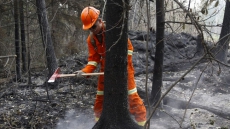TORONTO — More than 6,000 international experts on HIV-AIDS will gather in Vancouver this weekend to share the latest scientific advances in the fight to eradicate the disease, which first emerged almost 35 years ago and exploded into a global pandemic.
The 8th International AIDS Society (IAS) Conference on HIV Pathogenesis, Treatment and Prevention will bring together researchers, clinicians, community leaders and public health experts from around the world. It's the second time that Vancouver has hosted an IAS meeting in the last 20 years.
"This conference really is a focal point for the exchange of scientific information regarding HIV and AIDS," said Dr. Julio Montaner, director of the B.C. Centre for Excellence in HIV-AIDS, which is co-hosting the meeting.
The scientific gathering comes at a critical point in global efforts to control the pandemic, which has devastated populations in several developing nations, particularly in Africa, said Montaner.
On Tuesday, UN Secretary-General Ban Ki-moon announced that the goal of having 15 million HIV-positive people on antiretroviral therapy by the end of 2015 — the so-called 15 by 15 strategy — had been achieved in March, nine months early.
New HIV infections have fallen by 35 per cent and AIDS-related deaths by 41 per cent since the goal was set in 2000, primarily because of antiretroviral drugs, which suppress the ability of the human immunodeficiency virus (HIV) to replicate and infect cells. The triple-drug cocktail stops the infection from progressing to AIDS.
It was at the 1996 AIDS conference in Vancouver that researchers first heard about the effectiveness of antiretroviral therapy, or ART, which has turned HIV infection from an automatic death sentence into a chronic but manageable disease.
Montaner, whose team has been among those at the forefront of ART research, presented data at the 2006 IAS meeting in Toronto suggesting that the drugs could not only prevent HIV from developing into AIDS, but also stop transmission to others by significantly reducing viral levels in the body.
The UN program on HIV-AIDS, or UNAIDS, attributes the success of its "15 by 15" goal to the roll-out of antiretroviral therapy, and led Ban to proclaim this week that the world is now "on the way to a generation free of AIDS" — a target hoped to be achieved by 2030.
The latest research to be presented in Vancouver will show how close scientists actually are to that objective.
IAS president Dr. Chris Beyrer, a co-principal investigator of the Johns Hopkins Center for AIDS Research in Baltimore, said the conference will focus on four broad themes: earlier antiretroviral treatment; preventive treatment, known as PREP; research on a potential cure; and treating people co-infected with HIV and hepatitis C.
Among the key presentations is one on the implications of the START study, a randomized controlled trial of 5,000 HIV-positive people in 35 countries. The START trial was halted early when interim results showed that beginning antiretroviral treatment soon after diagnosis cut the risk of serious illness or death in half, compared with deferring treatment until the virus' effects on the immune system had reached a certain level.
"We're really pleased that we will see final detailed analysis of the START trial," Beyrer told a recent media briefing.

While many countries advocate early treatment, some like the U.K. follow a deferred treatment regimen, so disseminating the study results is important, he said.
Gottfried Hirnschall, head of the World Health Organization's HIV division, is scheduled on Monday to address the findings and what they might mean for the agency's treatment guidelines, which currently don't recommend starting antiretrovirals immediately after diagnosis.
Montaner, long a proponent of early therapy both for treatment and the spread of HIV, said the next goal to tackle is the "90-90-90" strategy unveiled last year and endorsed by the UN, which aims to end AIDS globally by 2030.
To achieve that objective, the 90-90-90 milestone would need to be met five years from now — with 90 per cent of people aware of their HIV status, 90 per cent of those infected on antiretroviral therapy, and 90 per cent of those being treated showing undetectable viral loads.
"Our monitoring shows that if we do that, the burden of disease will decrease by approximately 90 per cent ... by 2030," said Montaner.
"And that is the virtual elimination of the AIDS pandemic. We're not talking about eradicating HIV — HIV will remain a low-level endemic condition going forward and we will need a vaccine and we will need a cure.
"But the struggle that most affected countries have suffered because of the devastation that AIDS has brought ... all of that we can control today using the knowledge that will be brought together at the Vancouver international conference."
Montaner hopes the meeting will galvanize governments worldwide to invest in treatment for all HIV-infected people so "we can turn this epidemic around."
"That's the single most important legacy that Vancouver can leave behind."



